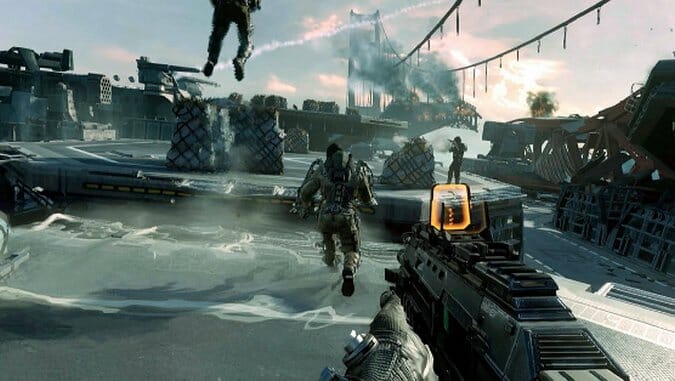Call of Duty: Advanced Warfare—Progression At Any Cost

Call of Duty is a blockbuster franchise. These games are created in order to appeal to the widest possible group of people while keeping them entertained and excited. Just as importantly, a blockbuster wants to get you excited for future iterations of itself. Blockbuster franchises want to live forever.
Any discussion of Advanced Warfare has to start from the baseline understanding that it is a videogame that exists as a rarefied media object. It cannot stray too far from its predecessors, but it also cannot be a mere repetition of its previous iterations. It is a first-person shooter game with a military setting, so it has to tread lightly around certain issues. At the same time, it cannot buy wholeheartedly into militaristic chest beating, because that would be seen as hopelessly naive and irrelevant. Advanced Warfare, from the conception of its narrative, architectural, and mechanical design, is forced to walk a much tighter line than critics of the series or genre might admit.
The Call of Duty games are at their most successful when they are making leaps forward in both mechanics and narrative delivery at the same time. Modern Warfare and Modern Warfare 2 are exemplary in this regard, completely altering the player’s perception of how they can move around in a first-person shooter world as well as changing what kind of story players can expect from games in that genre. While the effectiveness of these “leaps” in narrative delivery depends on how charitable you are as a critic, it is undeniable that missions like “Shock and Awe” or the infamous “No Russian” were attempts to do something new and critical in blockbuster videogaming.
Advanced Warfare, as the title suggests, wants to be the next revolution in the Call of Duty series. It wants to cut the same wide swath in the field of shooter game design as the original Call of Duty and Modern Warfare games did when they were released. It wants to leave the world of gaming fundamentally changed. And, to some extent and against all of my expectations, it manages to.
I want to say here that I’m not a “fanboy” of any particular game franchise (or even genre, if I’m being honest). I try to be the kind of critic who moves seamlessly between massive blockbuster releases and games released on small, personal platforms like itch.io. My own attempts to cover the full breadth of gaming itself have forced me into a weird dialectic of positivity and pure nihilism: everything is beautiful, everything is garbage. What follows this is the most measured review I can form of Advanced Warfare. I am neither an acolyte nor an enemy. I just play videogames.
Playing videogames—and then writing about them—means that I’m often thinking about what the Call of Duty games have managed to revolutionize in the past, at least a couple of times: the melding of narrative with mechanics that feel good to repeat over and over again. The shooter genre in particular has a difficult history with making this pairing work well. How do you create a gripping and powerful story that generates real pathos in a player when you’ve created a world fundamentally structured by the destruction of life and property? How do you build something beautiful out of something so profoundly negative?
Game designers have attempted to find their way out of this conundrum by leaning into their games’ mechanical weaknesses. If a shooter is too linear, thus inevitably leading to the same conclusion time after time? “Would you kindly?” answers that problem. You press R2 to kill a thousand enemies throughout the game? Press R2 to end it all. You can only interact with anything in the world through a limited vocabulary of “Press Square to X”? Press Square to crawl in a mass grave.
In Advanced Warfare, you press Square to pay your respects. As soon as review copies of the game were out, we saw the screenshot blow up on Twitter, confirming critics’ worst thoughts about the series: this game is merely all of these games one more time. Part of the critique comes from expectation, and another is a kind of face-palming at the idea that a game could try to communicate something so profoundly emotional as a death with a single press of a button.
A more charitable read on the situation: the player takes on the role of Jack Mitchell, a Marine living in the year 2054. On a combat mission in South Korea, his best friend Will Irons is trapped while performing a sabotage mission for a mobile attack platform. Mitchell falls to the ground and escapes while Irons is killed by the ensuing explosion. As Mitchell lies on the ground, a piece of debris flies toward his body. As he is dragged away by his commanding officer, we realize that his left arm has been severed, mirroring the trapped arm of his comrade. In the next scene we are standing in front of the coffin, listening to a speech. We receive a prompt to pay our respects, we press the button, we look down at the coffin past the sling where what is left of Mitchell’s severed arm rests. It lasts maybe five seconds. Paying your respects is purely trivial in the same way that pressing a button is.
Two minutes later you are embroiled in a combat mission working for the largest private military corporation in the world.
